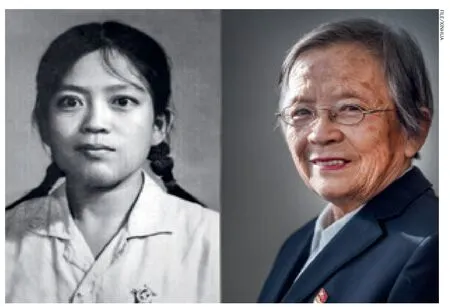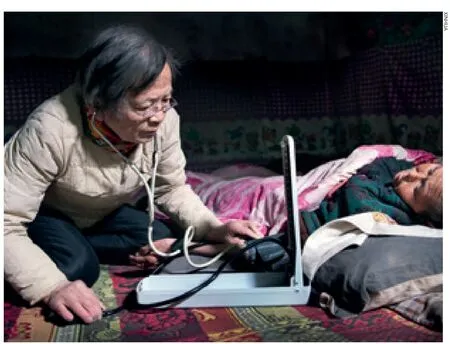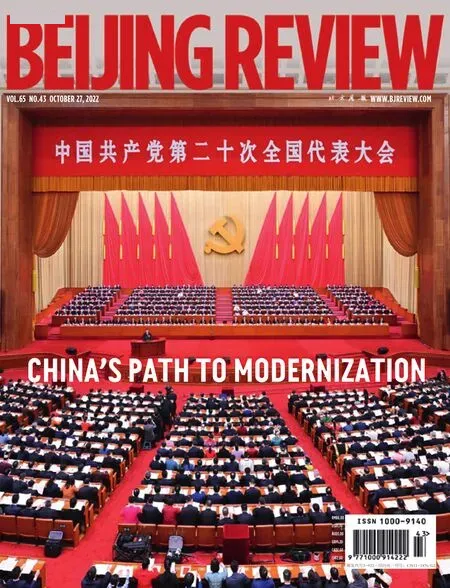A Promise Made Is a Promise Kept
A doctor spends 50 years protecting rural health By Tao Zihui
,
-.
,
.
—, a poem composed by Yuan Mei in the Qing Dynasty (1644-1911), translated by professor Wu Weixiong
Lu Shengmei, a doctor who has lived in a county in China’s northwestern Shaanxi Province for 54 years, cited the verse as one of her favorites.Growing up in Beijing, her dream was to become a pediatrician at a well-known large hospital in the Chinese capital. In 1968, after graduating from Beijing No.2 Medical College, now Capital Medical University, Lu was assigned to work in Jiaxian County, Yulin City, in Shaanxi.
The 78-year-old doctor, a delegate to the 20th National Congress of the Communist Party of China (CPC) and, prior to her retirement Vice President of a county-level hospital in Shaanxi, has devoted more than 50 years of her life to treating those at the most basic levels of society.
She’ll always remember how a professor once told her: “A doctor’s duty is to cure diseases and save lives. No matter the circumstances, no matter how tough the going gets. Remember that.” And Lu did.
One winter morning in 1968, a young, thin girl walked into Jiaxian People’s Hospital. As then-24-year-old Lu was about to embark on her career as a pediatrician there, she made herself a promise—“work for the Party for 50 years and serve the people of Jiaxian for 50 years,” Lu told. She kept that promise.
“Before the age of 24, I’d never left Beijing;and then I found myself a long way from home,”she recollected. “Living conditions were not as good as Beijing’s and to be honest, I did cry,” she said, smiling.
In the more than five decades that have passed since her initial arrival at Jiaxian, until her retirement in 1999 and even after, Lu has provided free treatment to more than 100,000 local patients.
A change of scenery
Located at the junction of the Loess Plateau and the edge of the Maowusu Desert, Jiaxian is a small county surrounded by hills and gullies.
Maowusu, or Mu Us, is one of China’s major deserts. It stretches from Ordos in Inner Mongolia Autonomous Region to Yulin. Its name stems from Mongolian, meaning “bad water,” and rightly so as the desert contains vast stretches of wasteland and saline-alkali water.
When making house calls, Lu had to travel along a treacherous mountain path, and because Jiaxian is a water-deficient county, the water locals drank came straight out of the Yellow River. Making matters even worse, back then,one person was allocated only one bottle of the not-so-clean water per day.
Lu had never lived in a, or a cave house, which is a form of earth shelter dwelling common on the Loess Plateau. But this was her new home.How to start a fire to keep warm in winter was the first hurdle she had to jump in her new life. Every time she’d try to light her little wood burner, the house would fill up with smoke and dust. After much trial and error, she simply gave up and would curl up on a cold bed every night. “Later on, when villagers found out I didn’t know how to properly use my wood burning stove, they’d come over to get the fire going for me every day,” Lu said.

Lu Shengmei in 1968, following her graduation from Beijing No.2 Medical College in December that year; a 77-year-old Lu on January 18, 2021

Lu Shengmei treats a patient in a cave house in Jiaxian County, Shaanxi Province,in January 2021
Jiaxian’s healthcare was poor, as was local hygiene awareness, which was of grave concern to Lu. She became determined to help Jiaxian’s residents improve their health, an endeavor she persisted in over the following five decades.
Lu’s professional demeanor, skills and generosity won her much praise from local patients. As did her perseverance.
One snowy day, when Lu was on her way to a patient’s home 5 km from where she lived, she slipped and fell a dozen times. To treat an infant for whooping cough, Lu once performed oral suctioning to clear mucus from the child’s mouth as it was unable to clear it on its own through coughing or blowing its nose.
To improve her professional skills, Lu adopted a routine of providing medical treatment during the day and studying at night.
While providing mobile medical services in rural areas, she needed to treat patients suffering from all types of diseases. She’d always make sure to prescribe patients with inexpensive but effective medication.
Due to the poor transportation infrastructure at that time, people often missed doctors’ surgery opening hours and physicians would travel across mountains on foot to provide checkups.
“There were times we couldn’t do much when a critically ill patient finally made it to the hospital after a long, arduous trip,” Lu said.
In 1983, Lu set up the hospital’s pediatrics department. As the number of successful treatments went up, the department developed a good reputation in the area and even attracted patients from neighboring Shanxi Province.
Lu has been happy to witness the improvements in living conditions and medical services in recent decades.
“Residents are no longer worried about what to eat and drink and their basic needs for water, electricity and natural gas are fully met,” Lu said, adding great changes have occurred in the local health sector.
Doubling down
As time went by, Lu received many tempting job offers from renowned medical institutions. But she declined all of them.
“When I first came to Jiaxian, it was a new place for me, but now it’s my home,” she said. “The people here need me. My family needs me.”
Many graduate medical students, too, came and went. Lu said that every time she saw someone off,she’d experience many conflicting emotions. It was in those moments that she would often ask herself,“Everyone wants to live in a place with good conditions. So why don’t I?”
The answer was simple: Her loyalty had always lain with the people of Jiaxian. “I promised my husband and my in-laws that I would not leave this place or them,” she said.
By 2018, Lu had fulfilled her 50-year promise to help Jiaxian’s residents improve their health. But instead of slowing down, she continues to work hard. The area’s palpable progress is what inspires and motivates her to keep going.
“Patients previously tended to bear any given illness as much and as long as they could, but now they will go see a doctor for even the slightest of ailments. That’s because the medical expenses no longer pose a major obstacle,” she said.
From outpatient clinic to operating table, Lu always believes offering patients even a little help can go a very long way. “I just do what a doctor should do, but the people here are so very grateful,”she said. “I, too, am extremely grateful to them [for always coming to my aid when I needed it most]and just want to be more helpful.”
In a sense, Lu changed Jiaxian and the county changed her. She met her beloved husband there.“If you love someone, you’ll always think about how that person might handle a difficult situation,”she said. “My husband was someone who, when he was still alive, always thought more about others;he was a good man whose light still shines on me,always.”
Time tests the beliefs and original aspirations of any Party member. “I’m old but I’ll continue to serve the people until my last breath,” Lu decidedly said. BR

